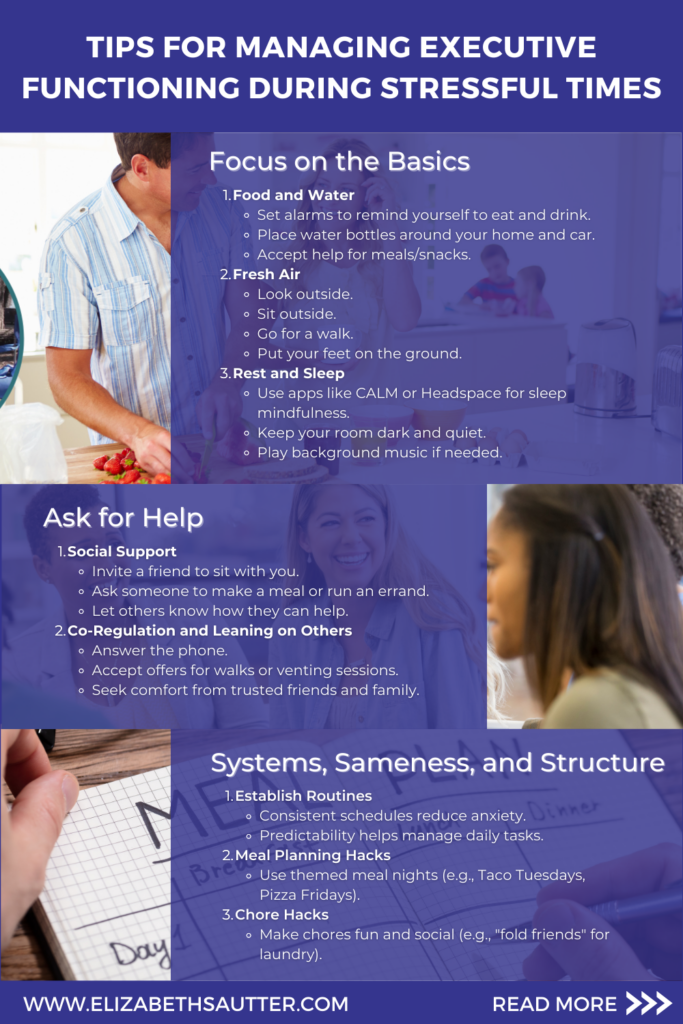Over the past two years, the stress has been even more intense than usual. I could go on with the various reasons but one of the biggest has been caring for my mom, who recently passed away.
This personal journey of grief and responsibility has been incredibly challenging, especially as I approach the second anniversary of my sister’s unexpected passing.
Recently I have been feeling like my brain just doesn’t work and it reminded me of the impact that stress, grief, and trauma can have on the brain first hand. I talk about it all of the time when coaching parents about how a child can not think, listen, or engage when the brain is offline but forgets what it feels like to manage big emotions daily that affect our ability to function and manage our daily lives, particularly our executive functioning.
Many of you might be going through similar difficult times or can relate, whether it’s a layoff from work, the stress of a demanding job, divorce, or the daily anxieties that come with raising a family. And it’s important to remember that our children are also dealing with their own stressors—academic pressures, social challenges, and general anxiety or emotional dysregulation. For neurodivergent children, navigating the world can bring additional daily stress, impacting their executive functioning significantly.

The Brain Under Stress: Fight, Flight, Freeze
When faced with stress or trauma, our brain’s primitive response mechanisms are activated—commonly known as the fight, flight, or freeze response. The reactive or downstairs brain takes over and protects us from danger or threats. The amygdala, the brain’s alarm system, hijacks our rational thinking processes, where we access our ability to problem solve, think ahead/plan, and organize. This is all part of executive functioning which helps us get things done and navigate our lives.
When we are stressed, anxious, or shut down, we can’t access that part of the brain. Even the simplest of tasks and decision-making can be more challenging because the brain is doing its job of taking care of us and focused on survival rather than daily functioning.
Tips for Managing Executive Functioning During Stressful Times
Sometimes the best thing is to let go of as many things as you can so that your brain and nervous system can have the time they need to calm down. In the meantime, here are some practical strategies to help manage and support executive functioning during these difficult times:
1. Focus on the Basics
- Food and water! When the brain shuts down or is under stress, it doesn’t always send signals of hunger or thirst. This can cause more dysregulation. So set an alarm to remind yourself to eat and drink and place water bottles all around, in the car, bedroom, and kitchen to make it easier to remember. When someone asks; how can I help? Tell them that a healthy meal or snack would be super appreciated!
- Fresh Air: Look outside, sit outside, go for a walk, and put your feet on the ground. This can reduce stress and improve mood.
- Rest and Sleep: If you are having trouble sleeping at night, try the CALM app or Headspace which has a sleep mindfulness practice. Keep the room dark and quiet and play background music if needed.
2. Ask for Help
- Ask one friend to come and sit with you. Ask another to make a meal or run an errand that you need to get done. Tell them that if others ask what would be helpful. It can be hard to ask but remember that people love to help, it gives them a feeling of joy and permits them to ask when they are in need.
- Co-Regulation and Leaning on Others: Answer the phone or accept when someone asks to go on a walk or listen to you vent or cry. Seeking comfort from trusted friends and family can help those emotional upheaval.
3. Systems, Sameness, and Structure
- Establishing routines and systems can provide a sense of normalcy and predictability. Consistent schedules help reduce anxiety and make daily tasks more manageable. Structure and predictability in environments can support both parents and children in navigating daily responsibilities with greater ease
- Meal Planning Hacks: Reduce decision fatigue with themed meal nights like Taco Tuesdays or Pizza Fridays.
- Chore Hacks: Make chores fun and social with methods like “fold friends” where you fold laundry together while chatting or listening to music.

Navigating the challenges of stress, grief, trauma, and overwhelm requires a compassionate approach to ourselves and our children. And when you are “in it”, it can be hard to remember some of these things so if you are reading this and have someone you know who might need some support—lean in, hold space, show them, and lead them your prefrontal cortex (where executive functioning lives) and be that co-regulator!
When we support ourselves in these ways or show up for others to provide support, it is modeling for our kids and showing them the tools and strategies that can help them too!
Remember, it’s not about doing it perfectly; it’s about finding what works best for you and your family during these difficult times.
For more tips and strategies, join our latest workshop where we offer executive functioning hacks for everyday life and tricky situations, especially needed when we are under stress. Learn more here: Practical Strategies Workshop.
 Join the Upcoming Workshop –
Join the Upcoming Workshop – 
